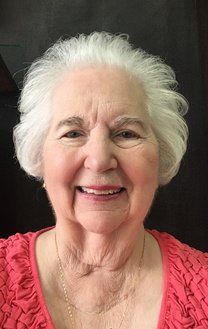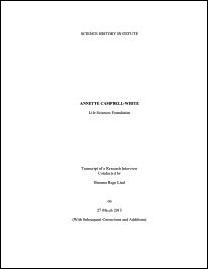
Oral history interview with Patsy Stallings Chappelear
- 2024-Jan-24 – 2024-Jan-25
Oral history interview with Patsy Stallings Chappelear
- 2024-Jan-24 – 2024-Jan-25
Patsy Stallings Chappelear was born in Burnet, Texas in 1931. She grew up during the Great Depression, moving often with her family as her parents sought work. She grew up with two brothers, one older and one younger. As a child, Chappelear enjoyed having tea parties, playing jacks, roller skating, reading, and being pushed on a swing by her father. She grew up going to Methodist churches, where she attended Sunday School and participated in the Methodist Youth Fellowship. She spent a lot of time with extended family, often at her grandmother’s home in West Texas. Chappelear shares memories of Pearl Harbor and remembers saving foil, recycling rubber, and canning food during World War II.
Chappelear especially enjoyed studying math in school and planned to go into the sciences; she was interested in becoming a brain surgeon. In high school, she got involved in public speaking and speech activities and acted in plays. Chappelear excelled in her studies, becoming valedictorian of her high school class. She decided to apply to and then attend Rice Institute, which had no tuition and would be financially feasible for her to attend.
At Rice Institute, Chappelear started her undergraduate education in the science-engineering category. The coursework was challenging, and she worked hard at her studies. When it came time to decide on a major, she was considering chemistry or chemical engineering. The very different responses from those two department heads made the choice for her, and she decided to study chemical engineering. Chappelear’s main extracurricular activity at Rice was participating in the newly formed Chaille Rice Literary Society. To earn some money during college and get experience in a plant environment, Chappelear worked at Champion Paper and Fibre Company. Chappelear also gained exposure to work environments during plant trips her senior year, which were led by Professor Arthur J. “Pappy” Hartsook (1891-1990).
The chemical engineering program was a five-year program, and her parents took pride in her graduation. Chappelear applied to jobs and was in demand as a woman engineer. She ultimately accepted a job offer from Shell Oil Company. At Shell, she worked in a research group on lubricating oils. Chappelear worked in a pilot plant and used a Podbielniak centrifugal extractor to carry out her research on extraction processes.
Chappelear met her husband, John Chappelear (1929-2017), through playing bridge. John also worked for Shell, but in a different office. Patsy and John quickly fell in love, started dating, and got engaged. Despite working in different parts of Shell, after their marriage, one of them was forced to resign in keeping with Shell’s nepotism policy, and Patsy left her job. She sought advice about job opportunities from her former professor, Riki Kobayashi (1924-2013). Kobayashi invited Chappelear to work with him on Handbook of Natural Gas Engineering. Their work on this classic text included sections on physical properties, gas hydrates, and phase equilibria.
Early in her career, Chappelear joined the Society of Women Engineers (SWE). She later joined and became active in the American Institute of Chemical Engineers (AIChE). Chappelear helped form the Fuels and Petrochemicals Division of AIChE and eventually became chair of the division. She also became the first female fellow of AIChE. She regularly attended conferences in her field, including AIChE conferences. One notable conference that Chappelear attended was the 1973 Van der Waals Centennial Conference on Statistical Mechanics in Amsterdam, the Netherlands, for which Chappelear coauthored papers that her colleagues presented. She also helped host a Cryogenic Engineering Group conference at Rice.
Over the years that she had her first three children, she did some small consulting jobs with Kobayashi. After her third child was born, she was eager to get back to work, and Kobayashi and Thomas W. Leland, Jr. (1924-1986) brought her on to work on their research team. Chappelear edited and reformatted research proposals, mentored PhD students and postdoctoral fellows, and programmed a computer in hexadecimal to run corresponding states calculations. Later, Chappelear used The Rice Computer in her work. Chappelear also worked with Norman Carnahan (1942-) on a project focused on gas hydrates in the Alaska Pipeline. Chappelear balanced her career with getting involved in her children’s schools and activities. During her pregnancy with her son and after he was born, Chappelear struggled with medical and mental health challenges. She remained at Rice during that time and her colleagues were supportive.
Chappelear’s husband received an opportunity to work with Shell abroad, leading the family to temporarily relocate to The Netherlands. During the time abroad, Chappelear went on speaking tours, attended an AIChE meeting in Munich, Germany, did consulting work for companies in Europe, and received recognition from scholars and universities she visited. Chappelear visited Czechoslovakia and Poland, getting a glimpse of life behind the Iron Curtain.
After returning to the United States with her family, Chappelear resumed her work at Rice. She also began working part-time for Hudson Engineering Corporation, making a complete edit of the GPSA Engineering Data Book and serving as a resource for staff needing help with data. Feeling that she was not getting the recognition and respect she deserved at Rice, she decided to look for other work. Chappelear accepted an offer to work as a process engineer at Hudson. The first startup that she attended was in Louisiana, and Chappelear was then assigned to lead the design of the South Pass project. She went offshore for the project startup and went offshore several other times in her career.
Chappelear soon moved into project engineering, working from the States for a project based in Gulf Cabinda in Africa and traveling to Japan for another project. She led an intensive process to develop two bids for the Saudi Aramco Yanbu project. Chappelear was a project engineer for a government contract working on modifying a helium plant in Amarillo, Texas. For a time, she was charged with recruiting and mentoring interns who worked at Hudson. While working for Hudson, Chappelear became a registered professional engineer.
As economic challenges impacted engineers in the 1980s, Chappelear’s husband decided to take an offer of early retirement from Shell, and Chappelear was laid off from Hudson. She was soon rehired and worked on writing a speech for an executive and critiquing a design for a government job. After retiring from Hudson, Chappelear did some consulting work.
Chappelear is active in her community. She has long been involved in her church, taking on leadership roles, sewing in the Sowing Seeds of Love program, and participating in mission trips. Chappelear plays and teaches bridge, conducts genealogical research, and spends time with her family. She has used her financial resources to create scholarships for students. She also judges engineering projects at Houston Community College and has participated in the Rice University Engineering Alumni organization. She was named Outstanding Engineering Alumna from Rice University in 1998.
During the interview, Chappelear reflects on the impact of her life and career, comments on ethics and encounters with professional plagiarism, shares her hopes for future innovations, and highlights the importance of safety in engineering work.
| Property | Value |
|---|---|
| Interviewee | |
| Interviewer | |
| Place of interview | |
| Format | |
| Genre | |
| Extent |
|
| Language | |
| Subject | |
| Rights | Creative Commons Attribution-NonCommercial-NoDerivatives 4.0 International License |
| Credit line |
|
About the Interviewers
Sarah Schneider is a Program Associate in the Center for Oral History at the Science History Institute. She has an interest in preserving and sharing immigration stories in the oral history collection. Schneider holds a BA in American Studies from Brandeis University and an MA in History (Public History track) from the University of Central Florida. She serves as a board member of Oral History in the Mid-Atlantic Region (OHMAR) and was on the 2024 conference committee for the Oral History Association (OHA) annual meeting.
Gayle J. Gibson is a Senior Fellow with Mission Possible Partnership and formerly on the Board of Carbon Engineering. Gayle was head of Engineering at DuPont when she retired after 34 years where she held a variety of roles including Chief of Staff to the Chair of the Board & CEO where she drove improved leadership engagement across the top layers of leaders. Gayle has wide expertise in product & process development, scale-up and commercialization, revamping innovation practices, business strategy, supply chain improvement, lean manufacturing, process engineering, research & development and fostering inclusive workplaces. Gayle is a Fellow and Trustee of AIChE, and serves as Co-Chair of the Grants Committee of the Foundation. She is also a past Chair of the Management Division and a member of the LGBTQ+ & Allies Community. Gayle is one of AIChE’s representatives on the Affiliates Council of the Science History Institute.
Institutional location
| Department | |
|---|---|
| Collection | |
| Oral history number | 1153 |
Related Items
Interviewee biographical information
| Born |
|
|---|
Education
| Year | Institution | Degree | Discipline |
|---|---|---|---|
| 1953 | The Rice Institute | Bachelor of Arts | |
| 1954 | The Rice Institute | Bachelor of Science in Chemical Engineering |
Professional Experience
Shell Oil Company, Deer Park Refinery
- 1954 to 1955 Engineer
Rice University, Department of Chemical Engineering
- 1955 to 1976 Senior Research Associate
Hudson Engineering Corporation
- 1975 to 1986 Senior Project Engineer and Senior Process Engineer
Self-Employed
- 1986 to present Consultant
Honors
| Year(s) | Award |
|---|---|
| April 1970 | Member, Sigma Xi |
| July 1980 | Fellow, American Institute of Chemical Engineers |
| 1981 | Recognition Award, Gas Processors Suppliers Association |
| March 1987 | Citation for Service, Gas Processors Association |
| 1998 | Outstanding Engineering Alumna, Rice University |
Cite as
See our FAQ page to learn how to cite an oral history.
Complete transcript of interview
chappelear_p_1153_updated_full.pdf
The published version of the transcript may diverge from the interview audio due to edits to the transcript made by staff of the Center for Oral History, often at the request of the interviewee, during the transcript review process.









